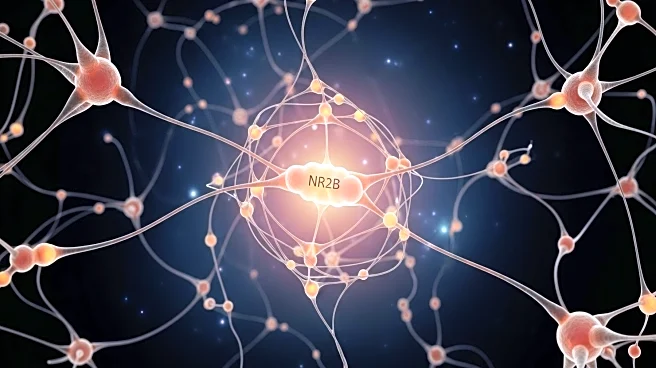What is the story about?
What's Happening?
A recent study published in Nature has underscored the critical role of NR2B-containing NMDA receptors in the prefrontal cortex for spatial working memory performance. The research involved experiments on Sprague-Dawley rats and rhesus monkeys, focusing on the prefrontal cortex, hippocampus, and visual cortex. The study utilized various behavioral tasks, such as the T-maze for rats and the Wisconsin General Test Apparatus for monkeys, to assess working memory. The findings revealed that the NR2B subunit is essential for maintaining working memory, as demonstrated by the performance of the subjects in these tasks. The study also involved the use of pharmacological interventions to observe the effects of NR2B antagonists on memory performance.
Why It's Important?
This research is significant as it provides deeper insights into the molecular mechanisms underlying working memory, a critical cognitive function. Understanding the role of NR2B-containing NMDA receptors could have implications for developing treatments for memory-related disorders, such as Alzheimer's disease and schizophrenia. These findings could influence future research directions and therapeutic strategies aimed at enhancing cognitive functions or mitigating memory impairments. The study's results may also contribute to the broader field of neuroscience by elucidating the specific neural circuits involved in memory processing.
What's Next?
Future research may focus on exploring the potential of targeting NR2B-containing NMDA receptors for therapeutic interventions in memory-related disorders. Further studies could investigate the long-term effects of modulating these receptors and their impact on cognitive functions. Additionally, research could expand to include other animal models or human trials to validate these findings and explore their applicability in clinical settings.
Beyond the Headlines
The study raises ethical considerations regarding the use of animals in research, highlighting the need for careful ethical oversight and humane treatment. It also prompts discussions on the potential societal impacts of enhancing cognitive functions through pharmacological means, including ethical implications and accessibility issues.















